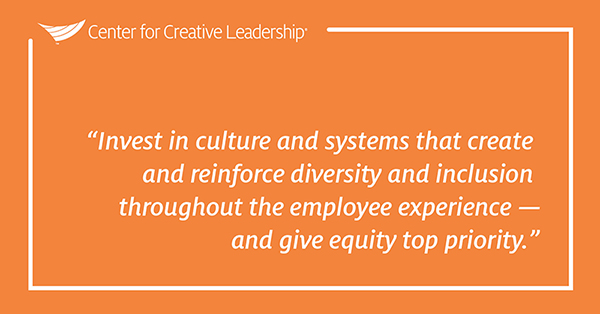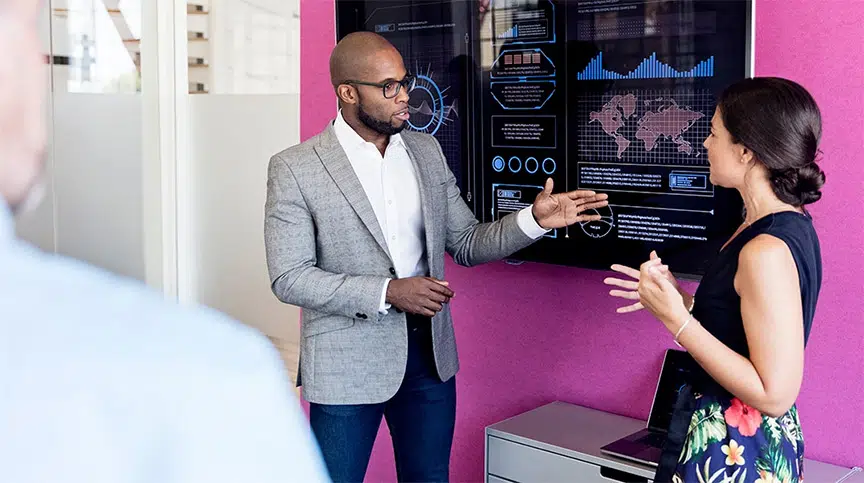Avoid These 3 Common Mistakes in Your Organization’s Diversity & Inclusion Initiatives
You know that accessing the full potential of all your talent is a strategic imperative — studies have repeatedly shown that diverse teams drive better business performance, and companies with more diversity become more innovative, resilient, and better able to respond to complex challenges.
But a study from Harvard Business Review found nearly 75% of employees in underrepresented groups — women, racial and ethnic minorities, and LGBTQ employees — don’t feel they’ve personally benefited from their companies’ diversity and inclusion initiatives or programs. That doesn’t even address a broader array of traits and identities, such as generation and national culture, or people with disabilities, which are also relevant to an organization’s workforce.
3 Common Mistakes to Avoid in Diversity & Inclusion Initiatives
Organizations struggle with their workplace diversity and inclusion initiatives for many reasons. We see a few common missteps:
1. Awareness-building without targeted action.
The value of diverse teams and organizations is widely documented. Numerous forms of diversity training have been deployed. Stories about pay inequity, overt and unintentional discrimination, and the experiences of marginalized employees and communities make headlines all over the world. And more and more people are learning about unconscious bias — the implicit associations about groups of people that we are unaware of and may not even consciously believe. But awareness alone doesn’t result in desired change.
People across organizations are frustrated. Champions of diversity and inclusion initiatives wonder what else they can do. Leaders are looking for the right solutions. Employees need training that supports them in their real-life, day-to-day interactions.
- What to do instead: We’ve learned from our clients — and our own experiences — that aligning awareness and education with targeted action can change the pattern and foster real progress. Progress requires thoughtful leadership, so focus your efforts first on ensuring equitable organizational policies and procedures. A foundational focus on equity is key.

2. New expectations without leadership engagement.
Often, efforts to create more diverse and inclusive organizations are viewed as merely HR work or as standalone initiatives. A diversity and inclusion initiative is launched, a compensation review is conducted to evaluate pay equity, or executives set expectations for greater diversity and inclusion — but the crucial role of leaders is minimized.
The capability to analyze issues through an equity lens, to authentically engage diverse people and perspectives, and to interact across cultures and one-on-one in ways that foster allyship and build a sense of belonging at work are critical leadership skills for an evolving world.
Managers throughout the organization need to learn and practice specific behaviors. They need to see how making changes or developing new skills will make a difference to them, their colleagues, and their organization. And they need ongoing feedback, challenge, and support to learn from experience.
- What to do instead: Organizations that are serious about improving their diversity and inclusion initiatives need to:
- define a leadership strategy;
- update leadership development offerings to support cultural intelligence, conversational skills, and more inclusive leadership practices; and
- create accountability systems to ensure leaders have the understanding and capability needed to leverage the talent of all employees.
3. Individual responsibility without organizational change.
People representing marginalized, minority, and underestimated groups have long been expected to change themselves to accommodate the dominant workplace or societal culture. Their success hinges largely on their ability — or inability — to adapt to the “norm,” whatever that is in their context. They have also had the burden of speaking for, or explaining the perspective of, their social identity group(s), or advocating for greater fairness, representation, and power.
The emphasis on individual responsibility often continues when organizations introduce well-intentioned measures to foster greater diversity & inclusion. Individuals who are part of dominant groups or who hold positions of power and influence are charged with learning and implementing changes. “Diverse” individuals are often put in the spotlight or expected to help their colleagues get it right. On any given day, an employee may be working with a willing ally, compliant colleague, or resistant co-worker.
But by leaning too heavily on individuals without developing organizational processes and practices, decisions are inconsistent, the burden is unequally distributed, and people remain wary, or even demoralized. Progress is slow, and the realization of a more diverse workplace falls short of expectations.
- What to do instead: To accelerate change and positive impact, invest in initiatives, culture, and systems that create and reinforce diversity & inclusion throughout the employee experience — and give equity top priority. Without a focus on equity, efforts to promote diversity & inclusion are laudable, but not sustainable.
We can partner with you to shift mindsets, behaviors, and practices toward more equitable, diverse, and inclusive teams and organizations. Learn more about our Equity, Diversity, and Inclusion practice and solutions.
Start Your Diversity & Inclusion Initiatives With Equity First
Start With a Focus on Equity, Then Diversity & Inclusion
Making progress on diversity & inclusion was top of mind for leaders around the world even before the events of 2020, which highlighted more prominently racial inequity and the need for action from organizations. The need for change has become more urgent now, as employees are frustrated, grieving, and demanding clear action.
At CCL, we believe the most successful organizational diversity, equity and inclusion (DEI) efforts prioritize equity first.
To reinforce this point, our perspective is that DEI initiatives will be more effective when framed as EDI initiatives, emphasizing the importance of pursuing greater diversity and inclusion only after investing in a culture of equity as the foundation.
Organizations can tackle the challenges, avoid serious missteps, and fast-forward progress on diversity and inclusion by using our 4-stage REAL™ framework to take action. The approach involves senior leaders taking responsibility for organizational change, while addressing EDI through building greater team and individual capability.
Ultimately, EDI is about culture, leadership, and making your business better. The way forward is different for each organization, but you can learn from what hasn’t worked in the past.
With a tailored approach that aligns awareness with action, addresses organizational culture and systems, and engages leaders, all while keeping the focus on equity, your company can reap the benefits of fully engaging the talents of all your workforce.
Ready to Take the Next Step?
We can partner with you to create custom diversity and inclusion initiatives that shift mindsets, behaviors, and practices towards more equitable, diverse, and inclusive teams and organizations. Learn more about our equity, diversity, and inclusion practice and solutions.










